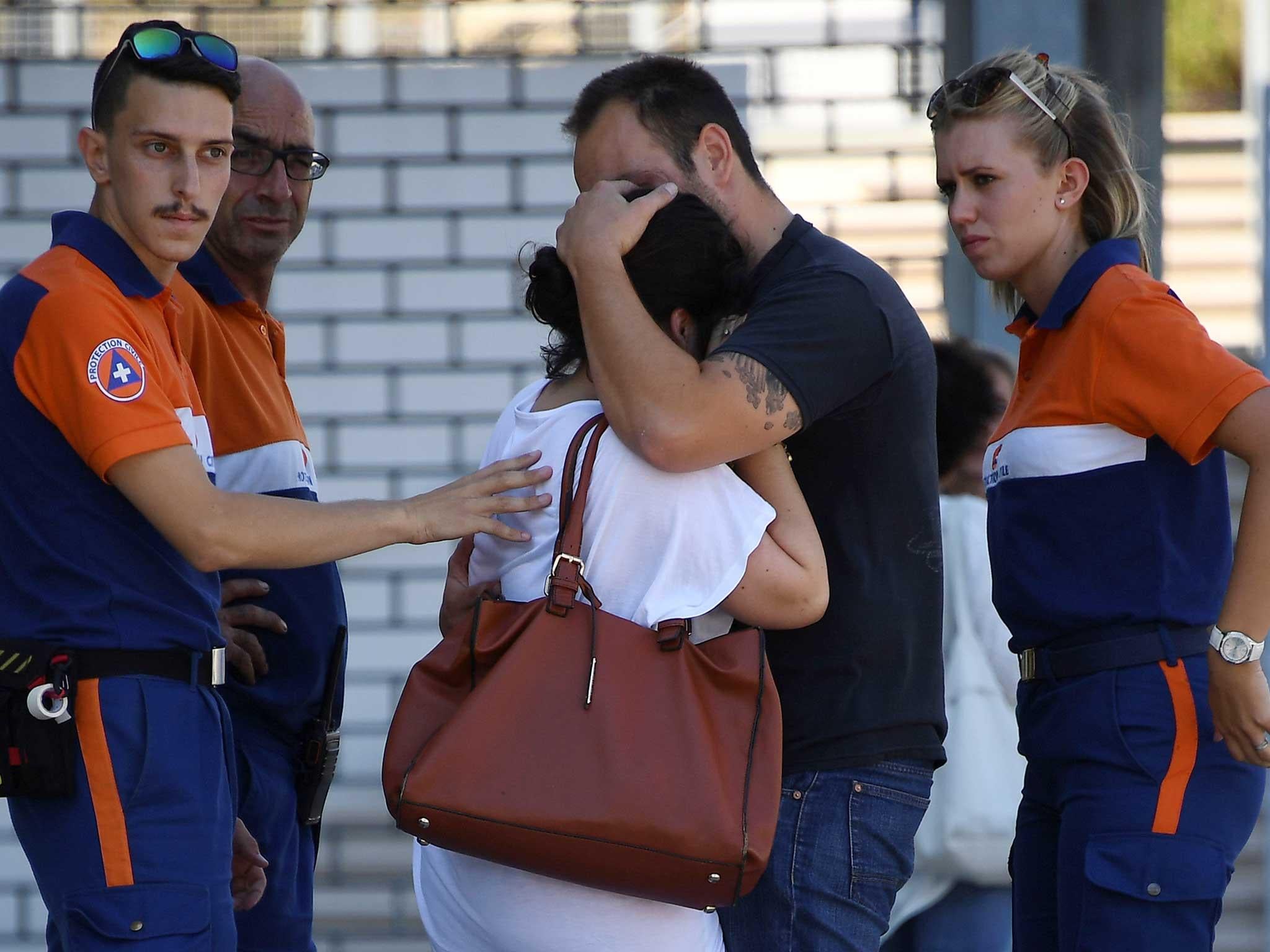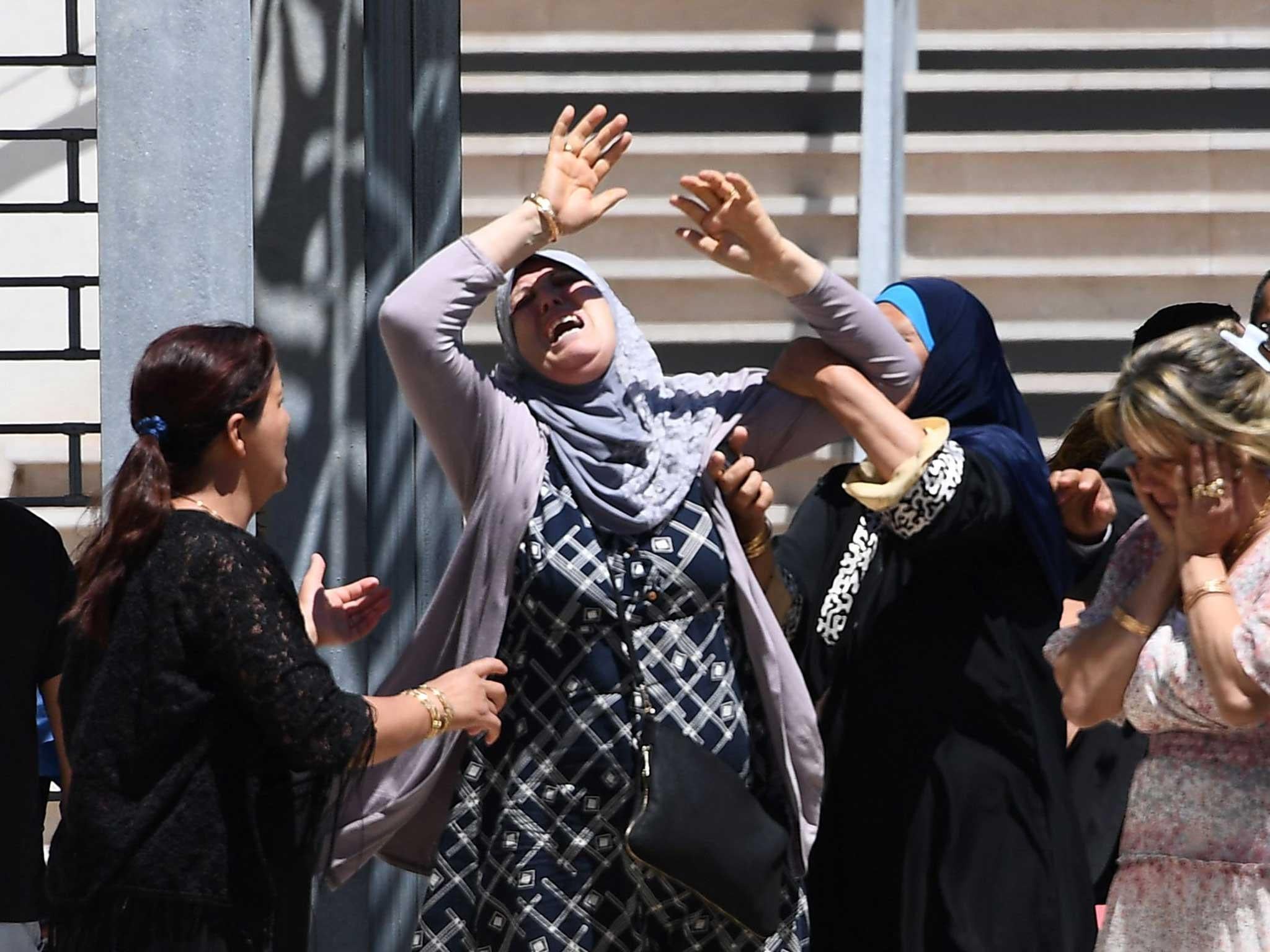Nice attack: Victims' families vent frustration at authorities with just 35 of 84 bodies identified
One of the problems with identification, say hospital staff, is the horrific nature of the injuries inflicted by the 19-tonne refrigerated truck, especially on young boys and girls he had mowed down

Your support helps us to tell the story
From reproductive rights to climate change to Big Tech, The Independent is on the ground when the story is developing. Whether it's investigating the financials of Elon Musk's pro-Trump PAC or producing our latest documentary, 'The A Word', which shines a light on the American women fighting for reproductive rights, we know how important it is to parse out the facts from the messaging.
At such a critical moment in US history, we need reporters on the ground. Your donation allows us to keep sending journalists to speak to both sides of the story.
The Independent is trusted by Americans across the entire political spectrum. And unlike many other quality news outlets, we choose not to lock Americans out of our reporting and analysis with paywalls. We believe quality journalism should be available to everyone, paid for by those who can afford it.
Your support makes all the difference.Hisham Kahlfallah had once again made the round of hospitals and he was exhausted when he turned up outside the victims’ centre in Nice. His sister Olfa was dead and her four-year-old son Kylan had been listed as missing. He could get no further details from the authorities about the little boy. Four days after the massacre on the promenade in Nice, just 35 out of 84 bodies of the victims had been identified.
Bereaved families are increasingly venting their frustrations at the authorities. When Christian Estrosi, the head of the regional council, turned up for an official visit at the centre on Sunday, Mr Kahlfallah could no longer contain himself.
“Christian, come to us, why are you not coming this way? We have questions for you, you call the media but you don’t call the families of the victims. What about our dead?” he said.
Mr Estrosi strode away, but an aide spoke to Mr Kahlfallah, explaining that the office of the public prosecutor was refusing to release the list until all checks had been concluded.
Kylan’s father, Tahar Majri, was outside the Pasteur Hospital where he thought he might find his son. “I have done everything, I have been to police stations, hospitals, tried Facebook. My wife is dead, where is my son? Bye, bye Kylan if I don’t see you again," he said, weeping.
Yannick Favre was also at the hospital, in search of his friend Jeanne, who has not been seen since the night of the attack.
“What happened was so bad; but this is a form of torture, not knowing, hoping she was at worst injured but not dead, but also fearing to hope,” he said, shaking his head. “It is really unacceptable that we are not getting this information, really unacceptable.”
The mood of anger and frustration, with the government seemingly impotent to prevent repeated terrorist attacks in the country, was shown today when the prime minister, Manuel Valls and other ministers arrived at the city’s Monument du Centenaire for a minute's silence in remembrance of the victims. Resounding jeers and boos were directed at them by the crowd. Many accuse the government of not having enough police on duty during the Bastille Day celebrations despite an ongoing threat.
The French authorities say they are doing what they can about the identification of the bodies. An accelerated procedure established after the Isis murders in Paris last November, using DNA and family medical records, is in place but they stress that it is impossible to give a definite timeframe.
“This process is step by step, so that everything is guaranteed the moment that the identities are established and released," said health minister Marisol Touraine. She added that up to a dozen more of the dead would be identified soon.
According to hospital staff one of the problems with identification is the horrific injuries inflicted by 31-year-old Lahouaiej Bouhlal’s 19-tonne refrigerated truck, especially on the young boys and girls he mowed down. Ten of those killed were children, as were 54 of the injured, the youngest a six-month-old baby.
But many feel that the authorities are not doing enough. An American student from Berkeley, Abhinav Kukreja, was distributing flyers outside the city’s central police station seeking the whereabouts of three friends who had been studying with him at the European Innovation Academy in Nice.
“The police weren’t helping us at all. We had made multiple calls, so we decided to bring out these flyers,” said Mr Kukreja. “The American embassy told us it was OK to go ahead, but the police are apparently unhappy that we are doing this.”
One of the friends Mr Kukreja was searching for, 20-year-old Nicolas Leslie, a fellow Berkeley student from San Diego, has in fact been declared dead by the French authorities to the FBI. But Misha Bazelevsky, a 22-year-old Canadian, and 21-year-old Rickard Krussberg, from Estonia, remain missing.
Relations of 12 of those killed were allowed to see the bodies of the victims for the first time on Sunday, when the authorities issued the first death certificates and also the first permission for funerals. Some of the families waiting anxiously had been Muslims whose religion requires burials to take place within 24 hours whenever possible.
The Sahroui family, originally from Algeria, were among those who went to see their dead on Sunday. They had lost a three-year-old girl and an eight-year-old boy, their mother and an uncle. Among those who went to the morgue to carry out a final identification was the children’s sister, a young teenager.

A volunteer counsellor at the victims centre, Yasmin Toauabia, said: "As you can imagine, they are in a state of shock.
"The grandmother kept repeating that her pain was not being able to bury them, the wait. They could at least have been buried right away if they had died at home.”
Brigitte Erbibou, a psychologist who has been working with survivors of the attack, described the reaction of two children whose father had been killed and whose mother is missing.
“The more the days go by, the more they suspect that the death announcement will come”, said Ms Erbibou. “ However, until it is announced, the wait is so difficult because there is no way to come to terms and begin the grieving process. That is what the children are telling me, they say 'with our Dad we know, but with our mum, it’s unbearable'.”
“ Some of these children have witnessed a scene of horror, they have witnessed their loved ones die. I’ve seen traumatic experience among the young before, but not on a massive a scale like this. Now, on top of all this, they have to go through this agonising period of waiting.”
Join our commenting forum
Join thought-provoking conversations, follow other Independent readers and see their replies
Comments